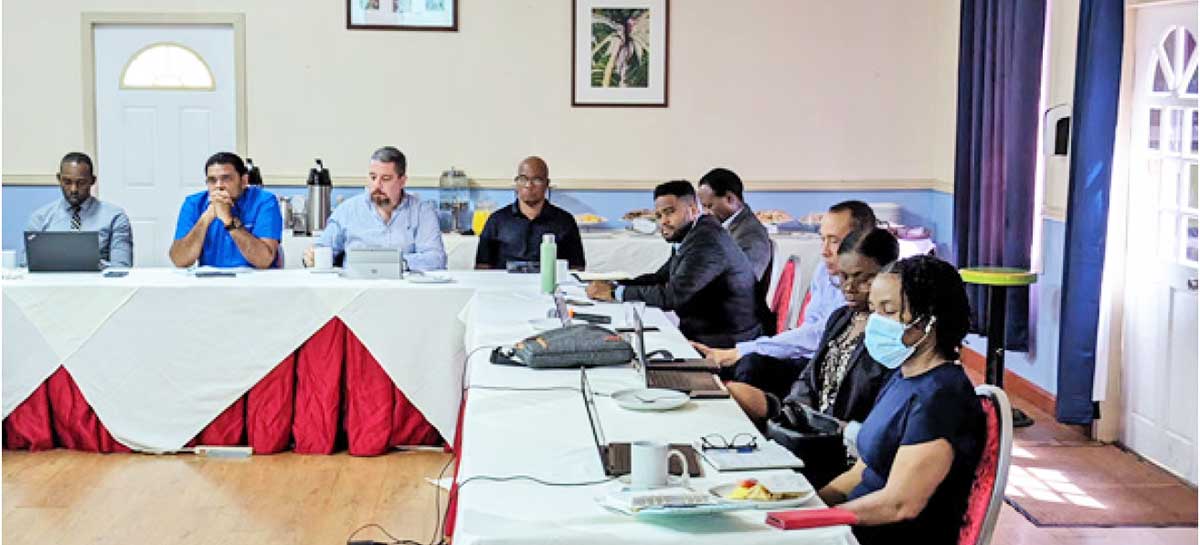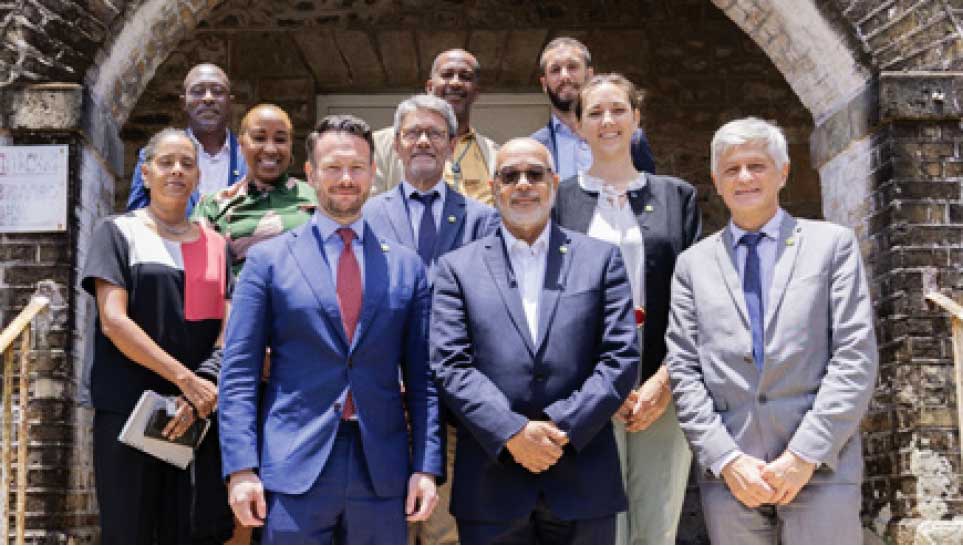“The OECS Business Council is about the indigenous private sector taking responsibility for its own development and seizing opportunities created by the economic union,” Dr. Didacus Jules, Director General of the OECS

In a series of collaborative efforts, the Organisation of Eastern Caribbean States Business Council (OBC) actively engaged esteemed private sector representatives across the region to gather feedback and insights on revitalising and redefining the role of the OBC within the sub-region. These consultations were held from November 2023 to April 2024 both virtually and in person.
Established in 2016 under the guidance of the late Sir Dwight Venner and the Eastern Caribbean Central Bank (ECCB), the OBC has faced various challenges in fulfilling its visionary objectives. However, motivated by the need for a dynamic advocate for the region’s private sector, the OBC secured funding from the OECS-European Union Regional Integration through Growth, Harmonisation, and Technology (RIGHT) Programme to embark on a comprehensive revitalisation project. The RIGHT Programme aims to strengthen capacity and create an enabling environment for sustainable economic development planning, growth and prosperity. The OBC will work towards this through effective private sector engagement and participation and aims to play a pivotal role in driving progress.
During the recently concluded consultations held in Anguilla, Antigua & Barbuda, Dominica, Grenada, Montserrat, Saint Kitts & Nevis, Saint Lucia, St. Vincent & the Grenadines, the OBC shared updates on its objectives, accomplishments, and strategic vision. The overarching goal is to transform the OBC into a proactive sub-regional private sector entity capable of advocating for its needs and addressing common challenges hindering the growth of businesses.
Dr. Didacus Jules, the Director General of the OECS briefly addressed each consultation meeting:
“The OECS Business Council is about the indigenous private sector taking responsibility for its own development and seizing the opportunities created by the economic union to contribute to national and regional development. Such expectations carry several critical assumptions, and these are that the private sector is organized with representational legitimacy to speak authoritatively on matters affecting it, and to propose solutions that not only enable the ease of doing business but also advance national and regional economic progress.
“It requires also a willingness and being able to invest in productive economic activity and be open to more diversified business that aren’t over reliant on the distributive sector.”
These consultations mark a significant step forward in the OBC’s revitalisation journey. After gaining feedback from the consultations, the OBC anticipates continued engagement with stakeholders, partners, and businesses to build a more vibrant and productive private sector in the OECS.
The OECS and Agence Française de Développement (AFD) Strengthen Collaboration for Environmental Sustainability

Meanwhile on April 29, the OECS welcomed a delegation from the Agence Française de Développement (AFD) led by Charles Trottmann, Head of the Three Oceans department of the Agence Française de Développement (AFD). This meeting marked a pivotal moment in enhancing cooperation between the OECS and France in addressing common environmental challenges.
A significant highlight of the visit was the signing of a project agreement for mangrove restoration in the OECS. At the signing, Domenico Ditaranto, Deputy Head of Mission at the French Embassy in Saint Lucia, joined the OECS Director General, Dr. Didacus Jules, and Charles Trottmann in formalising the agreement.
During the signing of the agreement, Trottmann expressed his support for the critical need for ecosystem balance and coastal preservation. He reminded the Director General of a conversation during a conference on regional cooperation, in which they shared their desire to strengthen collaboration between the AFD and the OECS. He said,
“Today marks, (I think) a new step towards the implementation of this strengthening of this collaboration. My visit also comes after a series of important French official visits in this territory. The Secretary of State, Chrysoula Zacharopoulou was here in February 2023, Minister Gerald Darmanin was here a month ago. It is also a sign of France’s commitment to its regional presence in the region. It is also important to note that this is the first visit to the OECS from a department director from AFD as well as a regional director.”
Dr. Jules echoed this sentiment, highlighting the grassroots efforts in member states to restore mangroves. He stated:
“The agreement that we are here to sign today is really an important area in which we’ve seen a lot of action being undertaken at a voluntary community level – the restoration of mangroves. There are several experiences in member states, in Grenada, in some of the British territories, where communities on their own are recognising the importance of restoring mangroves, not just for balance in the ecosystem, but also for its value to fisheries and for the preservation of coastlines.”
Trottmann reaffirmed AFD’s commitment to collaboration with the OECS, noting the significance of the visit in strengthening regional ties, while the Head of the OECS Environmental Sustainability Division, Chamberlain Emmanuel, affirmed the project’s potential to demonstrate effective regional integration and partnership between French and English territories.
The OECS team presented the latest advancements in the mangroves project slated to commence in the second semester of 2024. This initiative, set to receive funding from AFD and the French Facility for Global Environment (FFEM), will be implemented by the OECS and is currently in the drafting phase. This regional project promises to strengthen communities’ resilience against climate change while fostering regional integration among OECS sovereign states and associated member states, particularly French territories.
A team from the OECS Environmental Sustainability Division (ESD) led by Chamberlain Emmanuel further engaged in constructive discussions with Trottmann on tackling several regional environmental issues. During the discussions, Emmanuel emphasised the importance of designing tailored solutions for shared environmental issues, highlighting the need for collaborative approaches to address biodiversity loss, climate change, and ocean conservation and management in Small Island Developing States (SIDS). He also outlined the OECS’s mission – to foster equitable and sustainable improvement in the quality of life for people of the OECS – emphasising its commitment to the Green-Blue Economy, which prioritises climate resilience, sustainability, inclusiveness, and responsible management.
The visit also provided an opportunity for the OECS to give an update on the Recycle OECS project, an initiative being executed through a partnership between the OECS and the AFD. Recycle OECS is a pioneering initiative that is setting the stage for a paradigm shift in waste management across the OECS, and the goal is to develop a replicable model that can be easily adapted to suit the circumstances of other OECS Member States and document a case study for Small Island Developing states.
After the meetings, the delegation engaged in a field trip to Renew Saint Lucia, a recycling company, to explore further recycling possibilities in the region, discussing both challenges and opportunities.





